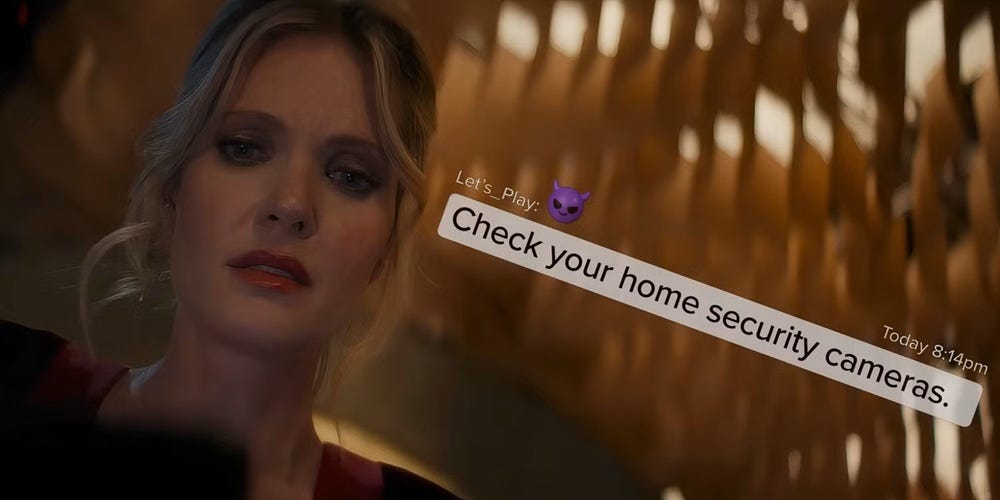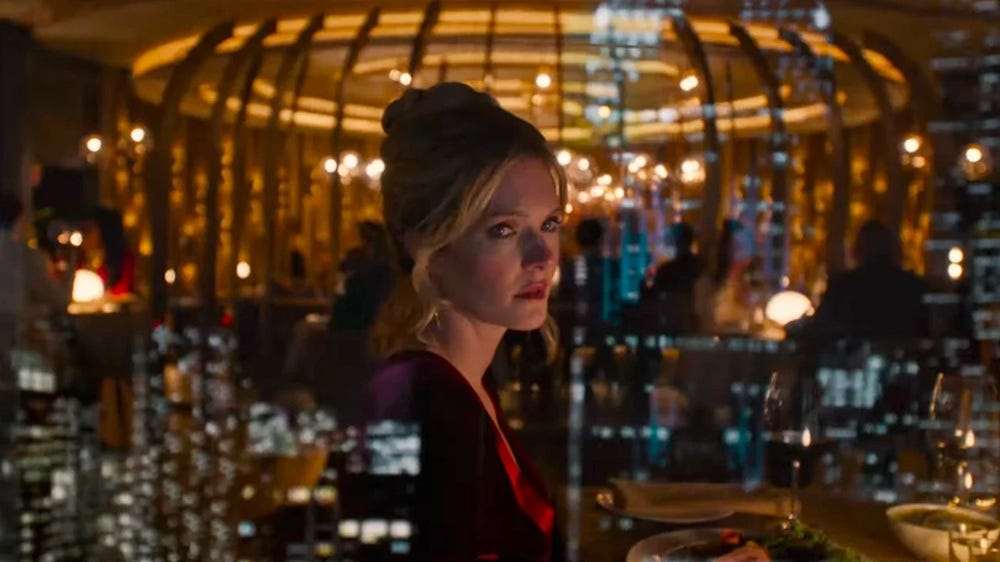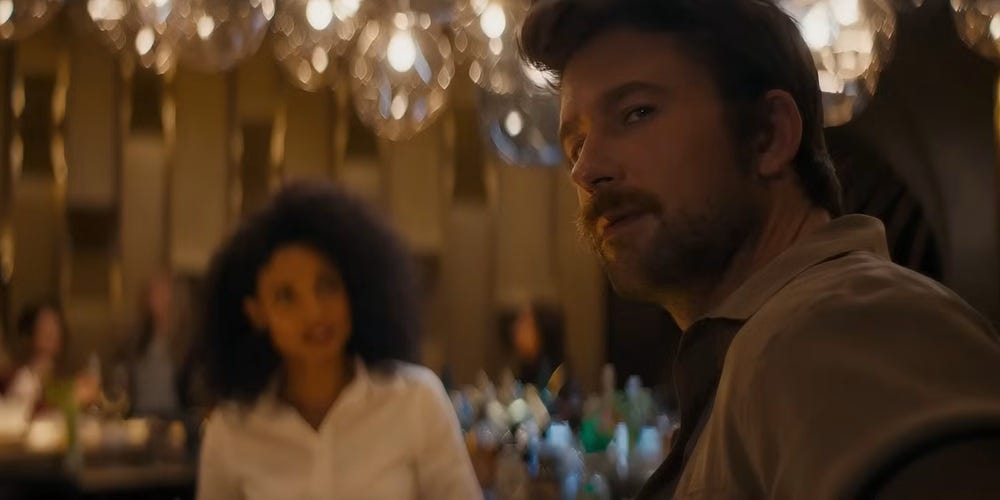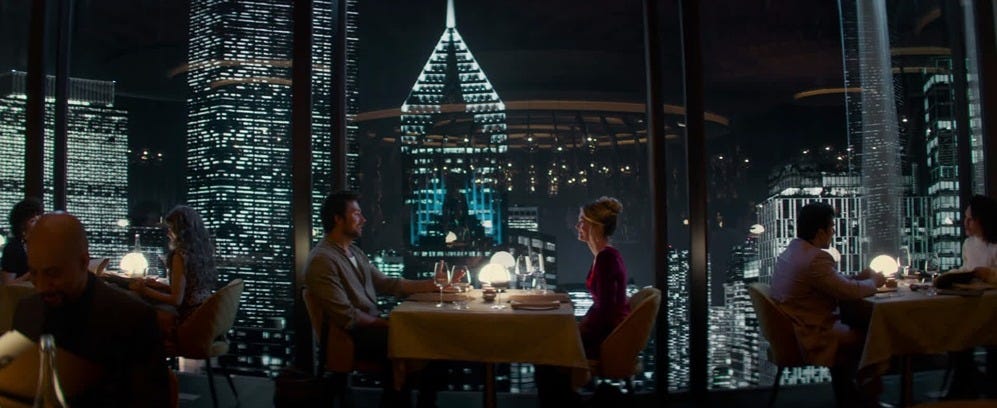Drop (2025) Review: A Dumb, Delightful First Date from Hell
Meghann Fahy leads a B-movie that embraces its stupidity—twisting a first date into a techno-horror freakout that’s mean, messy, and wildly entertaining.
Dating apps and wireless file sharing were supposed to make life easier. Instead, they’ve become perfect fuel for modern tech thrillers. Christopher Landon’s Drop leans into this paranoia with all the grace of a late-night text from an ex—and somehow makes it work. Landon, known for high-concept horror comedies like Happy Death Day and Freaky, trades in body swaps and campus slasher tropes for a swanky high-rise restaurant and a game of digital chicken played over an AirDrop-style messaging app. The result? A first date gone completely off the rails, dripping with tension, tech paranoia, and a whole lot of very entertaining nonsense.
Let’s be clear: Drop is stupid. But it’s the good kind of stupid. You know, the kind that knows exactly what it is, embraces it with both arms, and cartwheels through a plate-glass window just for the hell of it. There’s something refreshing about how confidently it leans into its absurd premise: a woman forced to play a deadly game through anonymous file drops while trapped on a date. And because Landon and his team are fully aware of the film’s B-movie DNA, that self-awareness becomes a strength. Like the best midnight movies, it lives and dies on energy, not logic—and lucky for us, this one has energy to spare.
A Stupid Idea, Handled Smartly
That logic-defying sincerity is baked into its lead character. Violet Gates (Meghann Fahy), a Chicago-based therapist and single mom, is still haunted by the trauma of her late, abusive husband. In an effort to move on, she agrees to a first date with Henry (Brandon Sklenar), a photographer with the emotional awareness of a Golden Retriever and the observational skills of a houseplant.
From the moment Violet walks into Palate—a swanky glass-box restaurant perched above Chicago—the film clicks into a zany groove. Before Henry even shows up, however, Violet begins receiving ominous “Digi-Drops” from an anonymous sender, asking if she’s ready to play a game. The interactions with the mysterious sender, playful at first, increasingly become hostile.

And just like that, the world’s worst first date begins. There are poisoned desserts, bugged table settings, secret SD cards, and a building full of red herrings. Every patron could be the villain—or none of them could be—and part of the fun is watching the film pretend it’s smarter than it is while knowing it’s actually not.
If this sounds like Saw by way of You’ve Got Mail, that’s because it kind of is. There’s real tension in the idea of a stranger hijacking your devices and threatening your family, but Drop isn’t aiming for tech-horror realism. It’s here to entertain, not to terrify—and in that regard, it succeeds. Violet is told she can’t leave, alert anyone, or let Henry walk out, or else her son dies. So she spends 95 minutes racing around the restaurant while Henry politely sits and wonders if maybe she’s just having an off-night.
Christopher Landon’s Latest Gamble: A Bonkers Third Act That Works
Landon is no stranger to the genre-scramble. His resume includes Happy Death Day, Freaky, and several Paranormal Activity sequels—not all of them good, but most of them proudly weird. What Landon brings to Drop is a director’s unshakable confidence. Even when the film wobbles tonally or stretches credibility, it never feels like it’s phoning it in. Say what you will about his filmography, but Landon rarely coasts.
Here, he doubles down on the single-location thriller formula and ratchets up the ridiculousness with every scene. And if the first half of the film is a slow simmer, the back half goes full scorched-earth. Characters are poisoned, people get shot, and the sleek restaurant turns into a warzone. Violet literally hangs by a thread during one nail-biting scene. Meanwhile, her sister Jen (Violett Beane) fends off a masked gunman back at home. And her little son Toby delivers a loaded gun via remote-controlled toy truck. This isn’t just suspension of disbelief—it’s full-on disbelief in a neck brace.
And yet, somehow, it works. Probably because the film leans so hard into its chaos that it becomes a feature, not a bug. If you’re going to break the rules, at least do it with style.
Meghann Fahy Carries the Whole Damn Thing
What keeps the film grounded, ironically, is Fahy. Her performance adds just enough emotional weight to stop the absurdity from floating away completely. And while Sklenar’s Henry—bless him—might be one of the dumbest photojournalists in recent memory, that’s okay. His obliviousness only makes Violet shine brighter. Her determination to survive and protect her family gives the movie its pulse.
Coming off her breakout role in The White Lotus, Fahy brings the same poise, timing, and emotional clarity to a much pulpier setting. She plays Violet with a mix of grit and nerves, turning what could have been a shrill final girl into a layered, sympathetic protagonist. Her therapist background feels earned, her fear convincing, and her decision-making—though occasionally unhinged—at least motivated by something deeper than plot necessity. We watch her face real emotional trauma, relive flashbacks of her abusive late husband, and navigate an escalating threat with quick thinking and cold resolve. Her characterization holds the film together even when the rest of it threatens to fly off the rails.
Notwithstanding Logic, A Surprisingly Effective Take on Tech Paranoia
Where Drop gets clever is in its use of modern tech. The “Digi-Drop” feature becomes a surprisingly effective horror mechanic—imposing a kind of invisible, omniscient presence in a public setting. The idea that someone can control your night with nothing but a Bluetooth signal (and strong Wi-Fi) is real enough to be unsettling. But the film doesn’t dwell on realism. Instead, it weaponizes the idea and moves on. In that way, it’s more Final Destination than Black Mirror—using modern anxiety as a launchpad for ridiculous escalation.
Let’s not kid ourselves, though: logic takes a backseat here. The villain’s scheme is ludicrous, the technology is magic, and the climax (which involves a hockey puck, a bullet hole, and physics straight out of Fast & Furious) is one of the funniest things I’ve seen all year. It’s so ridiculous it loops back around to entertaining again. By the time Violet’s dangling out of a skyscraper clinging to a tablecloth, you either roll with it or you’ve already left the theater.
There’s a case to be made that Drop is Landon’s most distilled work yet. He’s always had a knack for B-movie set-ups with high-energy execution, even when the results are hit-or-miss (I’m looking squarely at you, Paranormal Activity: The Marked Ones). But here, the tone is so committed, the script so gleefully unbothered by realism, that it actually works. For once, his “what if X, but stupid-fun” formula lands in the “worth it” category.
‘Drop’ is Dumb, Loud—and Weirdly Good
Drop is a good, forgettable film. And that’s a compliment. Not everything needs to reinvent the wheel. Some movies just want to strap a GoPro to the wheel and hurl it down a hill. It’s a film made by someone who clearly loves this kind of movie, anchored by an actor who takes it seriously enough that we can, too. And even when it veers into bad taste, it never stops being entertaining. A stupid thriller that works? That’s not a backhanded compliment. It’s a miracle.
In the end, think of it as the cinematic equivalent of a bad first date with great stories afterward. It’s nonsense, but it’s memorable nonsense. And because it’s smart enough not to take itself seriously, it never feels insulting. That’s a rare balance to strike in genre filmmaking—and honestly, a pretty impressive feat.
Will audiences remember it a year from now? Maybe not. Heck, I’m confident that I won’t. But as far as one-night stands with movies go, this one’s a keeper.






